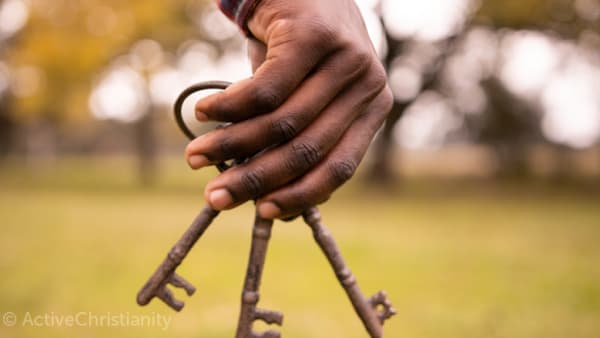“Therefore, since Christ suffered for us in the flesh, arm yourselves also with the same mind, for he who has suffered in the flesh has ceased from [stopped with] sin, that he no longer should live the rest of his time in the flesh for the lusts of men, but for the will of God.” 1 Peter 4:1-2.
From these verses, three things are very clear:
That we ourselves must suffer in the flesh in order to stop sinning – it wasn’t just Christ who suffered for us.
That it is only through suffering in the flesh that we can stop sinning.
That it is truly possible to stop sinning and do the will of God.
Christ suffered in the flesh
When Peter wrote that “Christ suffered for us in the flesh”, he wasn’t talking about Christ’s physical sufferings. It is clear that physical sufferings alone cannot help someone to stop sinning. We can see that from many examples in the world around us and throughout history.
No, Christ suffered in the flesh when He came to earth as a human being, with the same flesh and blood as us, and was tempted in all things just as we are, yet He did not sin! (Philippians 2:7; Hebrews 2:14; Hebrews 4:15.) So when He was born, He was born with a human nature, just like us. And therefore He could be tempted in all things, just like us. It was in this human flesh and blood that He was obedient to the point of death. (Philippians 2:8.) And He learned this obedience by the things which He suffered, as we read in Hebrews 5:8.
We see this suffering when He cried out to His Father with loud cries and tears, when His sweat fell like great drops of blood, so hard was He fighting to make sure that He would NOT sin in that temptation. (Luke 22:41-44; Hebrews 5:7.) In all of this, His whole desire was, “Father … not My will, but Yours, be done.”
There was a great inner battle and suffering that took place in Jesus so only God’s will would be done, not His own. This is what it means that He suffered in the flesh – this was not a physical suffering, it was an inner suffering where He fought hard to not give in to any temptation. And the result was that He overcame His own will, so that the will of His Father could be done on earth as it is done in heaven. (Matthew 6:10.)
“Then I said, ‘Look, I have come to do your will, O God— as is written about me in the Scriptures.'" Hebrews 10:7 (NLT).
We also have to suffer in the flesh
Now it is our turn to suffer in the flesh, so that we can stop sinning. Jesus also makes this clear when He explains who can be His disciple, His follower: “If any of you wants to be my follower, you must give up your own way, take up your cross daily, and follow me. If you try to hang on to your life, you will lose it. But if you give up your life for my sake, you will save it.” Luke 9:23-24 (NLT).
We come in these inner sufferings when we are tempted and have it the same as Jesus that “not my will, but Yours, be done”. Then we find that our flesh, our sinful nature, doesn’t want to give up its lusts and desires so easily. (James 1:14; Galatians 5:24.) Then, just like Jesus, we have to cry out for help. We also have to learn obedience through the things that we suffer (that is, when we suffer in the flesh).
But the incredible thing is that because Jesus has gone through the same thing (but did not sin), He knows and understands the temptations and sufferings that we face. And because of that He can help us when we are tempted. (Hebrews 2:17-18.) “Let us, then, feel very sure that we can come before God’s throne where there is grace. There we can receive mercy and grace to help us when we need it.” Hebrews 4:16 (NCV).
The help we get is that the Holy Spirit gives us the power to give up our own way and take up our cross, which quite simply means to say “No!” to each temptation, faithfully, over and over, until the temptation has been overcome. “No” again and again to our own will; to the lusts and desires of our flesh, of our sinful human nature. When we don’t give in to these sinful desires, it hurts. This is what it means to suffer in the flesh. But when we do this faithfully, when we resist temptation without giving up or giving in, we little by little stop sinning in that area.
The results of suffering in the flesh
The glorious result of suffering in the flesh is what is written in the end of the verse. We no longer have to live according to our lusts and desires, but can live according to the will of God. We no longer do what our flesh wants, what our sinful human nature wants, but we walk in the Spirit. And the Spirit shows us what God’s will is for us, and that is to get the fruit of the Spirit as our own nature. We grow in love, joy, peace, patience, kindness, goodness, faithfulness, gentleness, self-control. (Galatians 5:16-25.)
We stop sinning and we get Jesus’ nature! (2 Peter 1:4.) We become disciples of Jesus, we follow Him. In fact, He wants us to become His brothers!
“God, for whom and through whom everything was made, chose to bring many children into glory. And it was only right that he should make Jesus, through his suffering, a perfect leader, fit to bring them into their salvation. So now Jesus and the ones he makes holy have the same Father. That is why Jesus is not ashamed to call them his brothers and sisters.” Hebrews 2:10-11 (NLT).
It is because of this promise and joyful hope that we can say together with the Apostles:
“We have small troubles for a while now, but they are helping us gain an eternal glory that is much greater than the troubles. We set our eyes not on what we see but on what we cannot see. What we see will last only a short time, but what we cannot see will last forever.” 2 Corinthians 4:17-18 (NCV).
“… and since we are his children, we are his heirs. In fact, together with Christ we are heirs of God’s glory. But if we are to share his glory, we must also share his suffering. Yet what we suffer now is nothing compared to the glory he will reveal to us later.” Romans 8:17-18 (NLT).
“Dear friends, don't be surprised or shocked that you are going through testing that is like walking through fire. Be glad for the chance to suffer as Christ suffered. It will prepare you for even greater happiness when he makes his glorious return.” 1 Peter 4:12 (CEV).




